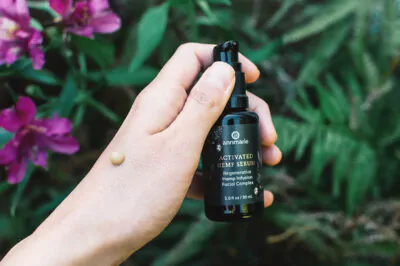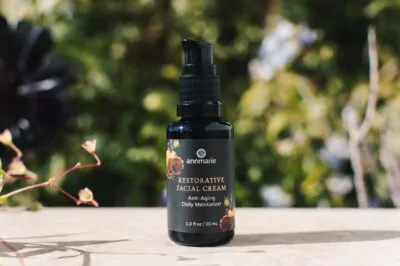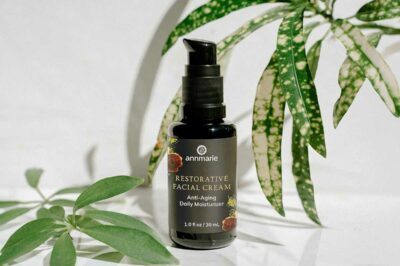Table of Contents[Hide][Show]
Vitamin E, also called “tocopherol,” isn’t just one compound—it’s actually a name used to describe eight chemical forms of fat-soluble compounds found in nature.
It was discovered in 1922 when researchers gave rats a purified diet devoid of vitamin E. The animals became infertile as a result. When researchers added wheat germ to the diet, the animals became fertile again. The oil-based substance that would become vitamin E was later isolated and called the “anti-sterility” vitamin, though later studies were not able to approve that vitamin E is needed for fertility.
Vitamin E (tocopherols) are needed in skin care, however! They have antioxidants, which can help protect and provide anti-aging effects.
A Little Bit About the Ingredient Itself
Natural vitamin E exists in eight chemical forms: alpha, beta-, gamma-, and delta-tocopherol, and alpha-, beta-, gamma-, and delta-tocotrienol. Alpha-tocopherol is the only form recognized to meet human health requirements so if you’re looking to supplementation, do some research in your chosen brand to make sure that its the right kind.
Vitamin E can be found in nuts like almonds, hazelnuts, and walnuts along with sweet potatoes, avocado, eggs, and greens. Since it is a fat-soluble vitamin, it does need to be absorbed with a fat, which means that people who aren’t absorbing fat, or not eating enough, can develop a vitamin E deficiency, which can cause digestive and urinary system problems over time.
5 Reasons Your Body Isn’t Absorbing Your Vitamins
Antioxidants: What Are They and Why Do We Need Them?
Internal Health Benefits of Vitamin E
Vitamin E is used by the body in a myriad of ways, and they’re all pretty important.
It’s most know for its antioxidant properties help protect cells from the damaging effects of free radicals, which can lead to cardiovascular disease and cancer but vitamin E is also involved in creating red blood cells, which are vital for proper circulation and oxygenation of the organs and tissues.
Vitamin E is known to protect artery walls and keep “bad” LDL cholesterol from sticking and creating artery narrowing. It’s also important in protecting the health of nerves, and in preventing mental degeneration due to aging. Some studies have indicated that vitamin E supplements may help reduce the risk of developing macular degeneration and cataracts.
Vitamin E’s Benefits to the Skin
Topically, it’s the powerful antioxidants that pull us to vitamin E. They protect the skin from environmental stressors like pollution and UV. Tocopherols also help tighten and firm the look of skin which makes vitamin E the perfect addition to any anti-aging formula.
Vitamin E has a long reputation as an effective moisturizer. Vitamin E is a thick oil and it works wonders to replace a night cream. You’ll want to add it to your favorite carrier oil—maybe with a drop or two of lavender essential oil to help calm yourself into a deep sleep—just because applying any sort of concentration can be a lot for the skin to handle all at once (nature creates synergistic blends and we are, after all, part of nature).
Vitamin E also makes a great natural preservative in skin care, so you’ll see it a lot in products. FDA labeling requirements prohibit the use of the word “vitamin” on cosmetic labels so if you’re looking for vitamin E in your skin care, look for the term “tocopherol.” Also consider the brand that you’re using, and maybe reach out to the company and ask about their vitamin E sourcing. There are a lot of ways to make vitamin E and many of those are synthetic.
Try It!
We think its important to source the most natural vitamin E possible so we work with a company that supplies vitamin E sourced from 100% from plants. We use them in a few of our favorite skin care products, particularly those that are likely to stay on your skin and help protect. Use these daily and you’re likely to see your skin become more resilient, moisturized, and youthful looking.
- Coconut Body & Face Oil
- Anti-Aging Serum
- Anti-Aging Facial Oil
- Herbal Facial Oil for Normal and Combination Skin
- Herbal Facial Oil for Oily Skin
- Radiant Skin Silk Body Lotion
* * *
Source
Alexander J. Michels, “Vitamin E and Skin Health,” Linus Pauling Institute, Oregon State University, February 2012, http://lpi.oregonstate.edu/infocenter/skin/vitaminE/index.html.








Good morning!
Does anyone know how to manipulate vitamin E powder in cosmetic formulations? How do I dissolve it before adding to the final product?
Kind regards,
Emanuel
Hi Annmarie,
Thanks for the interesting article. I make my own face oil blends and am keen to buy some Vit E (tocopherol) rather than the other Vit E options, where do you buy yours?
Best wishes,
Claire